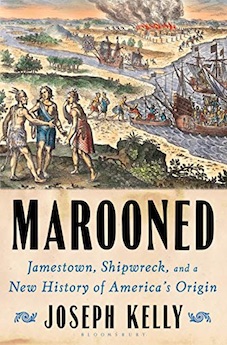By John McWilliams
To offer readers “a new history of America’s origin” is an open declaration of sweeping revisionist purpose. Insofar as “Americanness” reveals itself during the early years of the Jamestown settlement, its essence must be recovered, Joseph Kelly argues, not among the proto-capitalist adventurers who bought shares in the Virginia Company, not among the aristocratic officers and councilmen who ran daily operations, not even among the submissive workers who suffered and died, but among those who chose to maroon themselves, to opt out of injustice, to turn renegade, to go native—and to disappear from history. Such marooners should no longer be dismissed as the earliest instance of American “white trash.”
The revelatory American myth, Kelly insists, should not be the orderly Christian piety long claimed for the Pilgrims and Puritans, but the prospect of becoming psychologically and spatially lost, then transformed by the conditions of wilderness. The hoary historical models of Exodus, the New Canaan, City on a Hill (Matthew to Ronald Reagan) and Jeremiad are collectively the wrong paradigm for the American character. Replace them with individual self-creation mandated by willed isolation and minority drop out, by drastic entrance into a new, boundary-less world.
Kelly writes a lively, vivid narrative. As a chronology of what happened in Jamestown between 1607 and 1611, readers who do not know the scholarly achievements of Phillip Barbour, Leo Lemay, and Karen Kupperman will find much to surprise and enlighten. In addition to his Jamestown narrative, Kelly provides informative discussions of important contextual subjects: the etymology from Spanish of the noun and verb “maroon,” the would-be liberating piracies of Sir Francis Drake, Shakespeare’s The Tempest, the Turner Thesis, and Richard White’s notion of the frontier middle ground. Only a detailed account of the pertinence of the ongoing Jamestown dig seems missing, perhaps because its findings are published elsewhere.
Kelly’s thesis, however, raises vexing issues of historiography. He describes no less than fourteen instances of individuals or sizeable groups of marooners choosing to desert the Jamestown settlement. So much, so good for the importance of marooners during America’s founding. The difficulty, as Kelly acknowledges, is that the marooners themselves, workers of the “lesser sort,” left almost no record of their feelings, motives, or even their names. They remain silent or silenced witnesses to conditions of servitude approaching slavery. One can speculate about their feelings and motives at will, but one can substantiate nothing. Their sometime masters, born or risen into the “better sort” (Captain John Smith, Sir George Percy, Sylvester Jourdain, and William Strachey), penned the narratives, thereby creating what was soon to be called Jamestown’s early “history.” We may have recognized that “winners write history” for a long time now, but their having done so does not, by itself, validate a silenced counter narrative that cannot now be substantiated. The evidence is gone; the historian is left with questionable inference.
Space permits only the central example of the problem. Kelly challenges the longstanding notion that the many-sided Captain John Smith first embodied “the American character.” In Smith’s stead, Kelly offers “the man we might call the first true American,” one Stephen Hopkins, who was shipwrecked in Bermuda on the Sea Venture during the Third Supply. The only record of Hopkins’s rebellious principles is William Strachey’s 250 word summary of Hopkins’s secretive “arguments” defying the authority of Sir Thomas Gates, governor-commandant at Fort James: “It was no breach of honesty, conscience, nor religion to decline from the obedience of the governor or refuse to go any further led by his authority (except it so pleased themselves), since the authority ceased when the wreck was committed, and with it, they were all then freed from the government of any man, and for a matter of conscience it was not unknown to the meanest how much we were therein bounded each one to provide for himself and his own family.”
After Hopkins had endured shipwreck and marooning, he is said to have been “transformed” into rebellion. From Hopkins’s words as Strachey reported them, Kelly then argues that Hopkins had “formulated a theory of natural law that would become the basis of modern democratic governments.” Nowhere in Hopkins’s reported words, however, is there any mention of “natural law” or “democracy” or “liberty” or “equality” or “equal rights.” The most Hopkins appears to have claimed is that the necessity of providing for self and family “freed” him, once the wreck was committed, from any obedience to existing government. To have thereby been “freed” is admittedly a great deal, but it is not the same as the political condition later defined as American constitutional freedom. Was Hopkins advocating for “the basis of modern democratic governments”—or for his personal release from servitude, his license to be as he chose. Was he making a prescient appeal to the political rights of man—or an appeal to shipmates newly conceived as what Melville would memorably call “isolatoes federated along one keel?” If, as Kelly assumes, Jefferson and Madison are crucial to the formulation of American “democracy,” then democracy is inseparable from governmental protection of individual rights and from the forming of a compact for the general welfare. If one does not reconstruct civil society after defecting from civilization, marooning merges quickly into anarchy. In such ways can historical revisionism overreach while striving to lend continuity and new meaning to the past.
John McWilliams (ΦBK, Princeton University, 1962) is an emeritus professor of humanities at Middlebury College and a resident member of the Beta of Vermont Chapter of Phi Beta Kappa.




